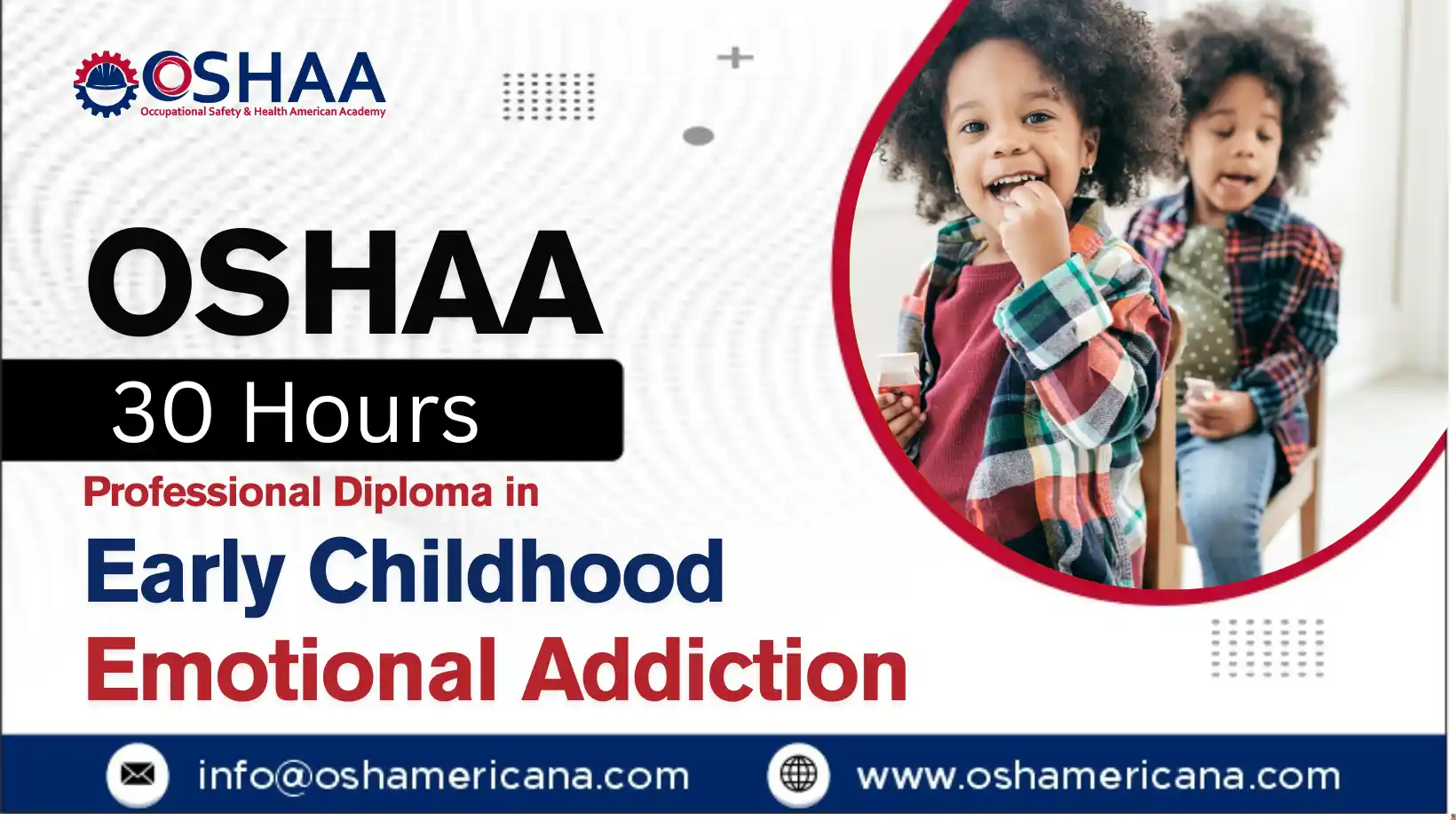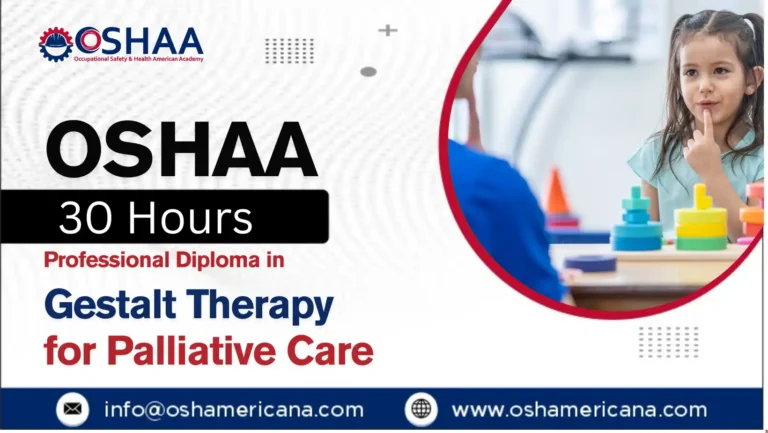The OSHAA 30-Hours Professional Diploma in Early Childhood Emotional Addiction is a specialised Continuing Professional Development (CPD) course tailored for participants working in child development, mental health, education, and care services. This diploma introduces key psychological and emotional concepts surrounding the formation of dependency patterns in early life and their long-term impact on behaviour, relationships, and emotional resilience.
This course equips participants with the tools to recognise, interpret, and support young children displaying signs of emotional dependency or unhealthy attachment patterns. It blends theory with practical guidance to foster safe, nurturing, and developmentally appropriate care environments.
Early emotional experiences significantly shape brain development and interpersonal behaviours. When children form unhealthy dependency patterns—whether through overindulgence, neglect, or inconsistent caregiving—they may struggle to regulate emotions, form secure relationships, or build autonomy later in life.
Participants in this diploma course explore how emotional addiction can manifest in early childhood settings, including its links to behavioural challenges, attachment styles, and emotional dysregulation. The course also provides a framework for supporting emotional independence and fostering secure relational bonds.
The OSHAA 30-Hours Professional Diploma in Early Childhood Emotional Addiction offers a unique and highly relevant opportunity for participants working with young children to understand the roots of emotional dependency and support healthier developmental outcomes. This course promotes not only academic and theoretical understanding but also compassionate, practical application—essential for those dedicated to fostering emotional wellbeing from the earliest years of life.
OSHAA 30-Hours Professional Diploma in Early Childhood Emotional Addiction
Study Units
Learning Outcomes
Foundations of Emotional Development and Attachment Theory (3 hours)
- Understand key stages of emotional development in early childhood
- Recognise the principles and classifications within attachment theory
- Identify how secure and insecure attachments influence behaviour
- Establish a foundation for interpreting early emotional needs
Understanding Emotional Dependency and Addictive Patterns in Childhood (4 hours)
- Define emotional addiction within the context of early childhood
- Distinguish between healthy attachment and dependency behaviours
- Examine the psychological mechanisms that reinforce emotional reliance
- Explore how emotional rewards contribute to addictive behavioural cycles
Behavioural Indicators of Emotional Addiction in Early Years (3 hours)
- Identify observable signs of emotional dependency in children
- Analyse behaviours such as excessive reassurance seeking or emotional withdrawal
- Understand the emotional triggers that reinforce dependency patterns
- Recognise the importance of early detection and sensitive response
The Role of Caregivers and Environmental Influence (6 hours)
- Explore the impact of parenting styles and adult responses on emotional development
- Understand how routine, stability and communication shape dependency behaviours
- Assess the role of attachment figures in either reinforcing or reducing emotional addiction
- Learn how environmental stressors contribute to behavioural outcomes
- Reflect on caregiver-child dynamics and boundaries
- Apply relationship-based approaches in early years settings
Neurobiology of Attachment, Reward and Regulation (4 hours)
- Understand the brain structures involved in emotional processing and attachment
- Explore the role of neurotransmitters in reward and emotional reinforcement
- Examine the impact of stress hormones on self-regulation in young children
- Link brain development to behavioural expressions of emotional need
Impact of Trauma, Neglect and Inconsistent Caregiving (3 hours)
- Recognise how adverse childhood experiences affect emotional security
- Understand trauma-related behaviours linked to attachment disruption
- Identify patterns of emotional avoidance or hypervigilance
- Explore the long-term developmental risks associated with neglect or unpredictability
Strategies to Support Emotional Autonomy and Resilience (4 hours)
- Apply age-appropriate methods to encourage self-regulation and independence
- Use therapeutic play and positive reinforcement to build emotional strength
- Introduce routines and boundaries that support secure emotional growth
- Develop tailored strategies for different emotional needs and attachment styles
Creating Emotionally Nurturing and Responsive Environments (3 hours)
- Design environments that promote emotional safety and connection
- Understand the importance of consistency, empathy and trust in early years settings
- Apply communication techniques that validate and guide children’s emotional expression
- Integrate emotional literacy tools to support resilience and wellbeing
Course Benefits: OSHAA 30-Hours Professional Diploma in Early Childhood Emotional Addiction
- CPD-Certified Qualification
Gain a recognised 30-hour Continuing Professional Development diploma that enhances your professional portfolio in early years education, mental health, and child wellbeing. - In-Depth Understanding of Emotional Dependency
Develop a specialised understanding of emotional addiction in early childhood, helping to identify and support children at risk of developing unhealthy attachment patterns. - Enhanced Observational and Intervention Skills
Improve your ability to detect early behavioural signs of emotional dependency and apply appropriate, evidence-informed interventions. - Application of Attachment Theory in Practice
Learn how to use foundational psychological principles to support secure, nurturing relationships and healthy emotional development. - Supportive Techniques for Caregivers and Practitioners
Gain practical strategies to guide children towards emotional resilience, autonomy and healthier coping mechanisms in care or educational environments. - Trauma-Aware, Inclusive Approach
Understand how trauma and inconsistent caregiving impact emotional development and apply techniques that promote healing and stability. - Promotion of Emotionally Safe Environments
Learn how to create settings that encourage trust, emotional literacy, and behavioural self-regulation in early years contexts. - Culturally Sensitive and Ethical Practice
Explore emotional dependency within cultural and societal frameworks while maintaining ethical standards in your support role. - Improved Professional Confidence
Strengthen your confidence in working with vulnerable children, families, and multidisciplinary teams by applying structured, research-based knowledge. - Flexible Learning Pathway
Study at your own pace while acquiring tools that can be immediately applied to childcare, education, and family support settings.
The OSHAA 30-Hours Professional Diploma in Early Childhood Emotional Addiction is designed for participants who work closely with young children and wish to deepen their understanding of emotional development, attachment, and behavioural wellbeing. This course is ideally suited for:
- Early years educators and childcare practitioners
- Child psychologists, therapists, and mental health support workers
- Social workers and family support professionals
- SEN and inclusion specialists in educational settings
- Foster carers, adoptive parents, and residential care workers
- Health visitors and paediatric care assistants
- Pastoral care staff and safeguarding officers
- Individuals working in trauma-informed or therapeutic early years environments
Participants seeking to enhance their knowledge of emotional dependency patterns and apply supportive, developmentally appropriate interventions will find this course especially valuable. It provides the skills and insights needed to promote emotional resilience and secure attachment in children during their formative years.







